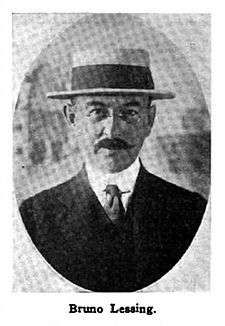Rudolph Edgar Block
Rudolph Edgar Block (December 6, 1870 – April 29, 1940) was a Jewish American journalist, columnist, and author. Much of his writing was done under the pen name of Bruno Lessing.[4]
 | |
| Born | December 6, 1870 |
| Died | April 29, 1940 (aged 69) |
| Occupation | journalist, columnist, author |
| Spouse(s) | Verda Block |
| Children | Rudolph,[3] Albert |
Biography
Rudolph Block began his career as a journalist in 1888. He worked first as a news reporter on The New York Sun and later joined The New York World. In 1896 he became the editor of the comic supplements to the Hearst newspapers,[4] a position he held for the next twenty-eight years.[1] During his tenure he supplied text for The Yellow Kid[5] and helped to create such popular series as Happy Hooligan and The Katzenjammer Kids.[1] As Bruno Lessing his short stories chronicled life in the Jewish ghetto of New York City.[6] Between 1905 and 1909 many of these tales were published by Cosmopolitan, which at that time was a literary magazine.[7] During the years 1915 – 1916 he also wrote a number of screenplays depicting the Jewish American experience.[8]
Ambrose Bierce, another frequent contributor to Cosmopolitan,[9] mentioned Block in his satirical work The Devil's Dictionary, recounting the author's alleged encounter with a prominent critic.[10] A short poem by Bierce, titled "Rudolph Block", had likewise no apparent connection to the man himself.[11]
An avid traveler, Block wrote about his experiences in the daily newspaper column "Vagabondia", which was published from 1928 through 1939.[12][13] Along the way he amassed a collection of 1,400 walking sticks, although he himself walked unaided.[14] After his death, the collection of canes, each made from a unique type of wood, was donated to Yale University.[15]
Selected works
- 1903 Children Of Men [16]
- 1909 Jake Or Sam
- 1914 With The Best Intention
References
- William J. Burling, Bruno Lessing, vol. 28 of Dictionary of Literary Biography, (Detroit: Gale Research Co. 1984), pp. 133–136.
- St. Petersburg Times May 2, 1940
- Bruno Lessing's Son Gets Post In Seattle jta.org. Retrieved: January 27, 2014.
- Rudolph Edgar Block fr.wikipedia.org. Retrieved: January 27, 2014.
- Around the World With The Yellow Kid virginia.edu. Retrieved: January 28, 2014.
- The International Story by Ruth Spack, (New York, NY: Cambridge University Press, 1994) p. 62.
- The Dream Of A New Social Order by Matthew Schneirov, (New York: Columbia University Press, 1994) p. 242.
- Bruno Lessing imdb.com. Retrieved: January 27, 2014.
- Ambrose Bierce google.com. Retrieved: January 27, 2014.
- Definition of the word "story" pangyre.org. Retrieved: October 18, 2016.
- Shapes Of Clay, vol. 4 of The Collected Works Of Ambrose Bierce, (New York & Washington: Neale Pub. Co., 1910) p. 373.
- The New York American April 5, 1935
- The Milwaukee Sentinel December 21, 1939
- Catalogue Of A Private Collection Of Walking Sticks openlibrary.org. Retrieved: January 27, 2014.
- Rudolph Block's Collection: Canes Of Various Woods lumberjocks.com. Retrieved: January 27, 2014.
- American Jewish Fiction by Josh Lambert, (Philadelphia: Jewish Publication Society, 2009) pp. 19–20.
External links
- Works by or about Bruno Lessing at Internet Archive
- Works by or about Rudolph Edgar Block at Internet Archive
- Bruno Lessing photo 1903
- Articles
- "The End of the Task"
- Short story: pp. 600–607.
- Dramatic reading by Ethel Olson.